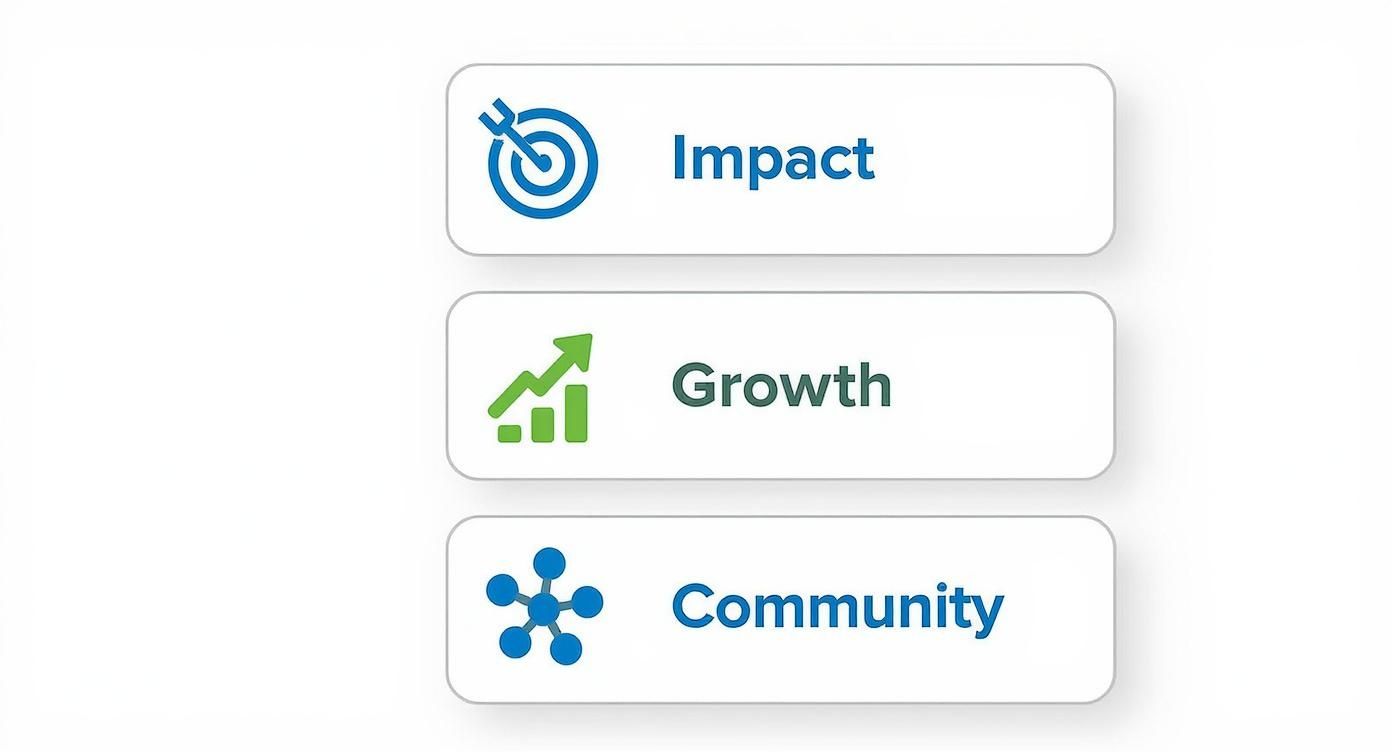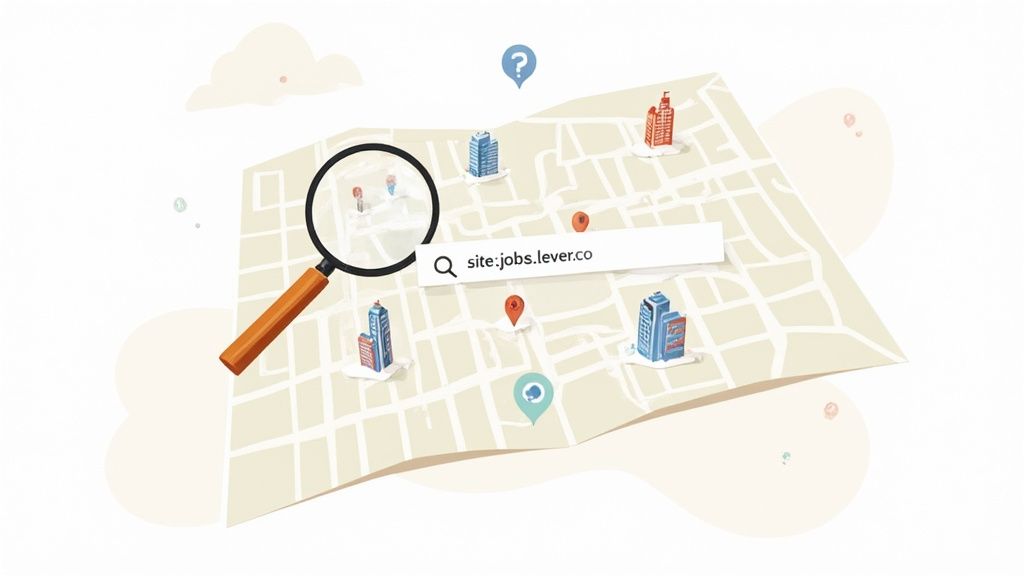Forget packing your bags for a major tech hub. The old playbook of moving to find a great startup job is officially retired. Today, your next career-defining role might be just around the corner.
The startup scene isn't confined to a few zip codes anymore. It's a sprawling, thriving ecosystem with incredible opportunities popping up right in your own backyard.
The idea that you can only find a game-changing startup role in Silicon Valley is quickly becoming a myth. While the big hubs still pack a punch, the entire startup world is seeing explosive growth.
This decentralization is creating massive opportunities for tech professionals who'd rather build their careers closer to home. You no longer have to pick between a high-impact job and the community you love.
And this isn't just a hunch; the numbers back it up. The global startup ecosystem is projected to grow at an average annual rate of 21% by 2025. That rapid expansion means new jobs are opening up in all sorts of industries and, more importantly, in a much wider range of cities.
Joining a startup in your own city comes with some unique perks that are often harder to find in the crowded, established tech centers. These advantages can seriously fast-track your career and lead to a more fulfilling experience.
Here’s a practical look at what you stand to gain:
The most compelling reason to join a local startup? You get to be on the ground floor of your city's next big success story. You’re building a career with tangible, immediate impact while contributing directly to the local economy.
Even the traditional tech hubs are changing, offering a mix of early-stage ventures and more established companies. If you happen to be in a major city, checking out the dynamics of startup jobs in San Francisco can give you a solid blueprint for what to look for in your own area. The core principles of seeking impact, growth, and connection are universal.
Long before a recruiter ever sees your resume, they'll almost certainly stumble across your online profiles. In the hunt for "startup jobs near me," your digital presence is the very first handshake—and a generic profile just won't make the cut.
You need to send a clear signal to local hiring managers that you’re not just qualified, but also plugged into their specific tech community. This is about shifting your profiles from a passive, digital resume into an active magnet for the exact opportunities you want.
Think like a recruiter for a minute. When they’re hunting for local talent, they’re using specific search terms. To pop up on their radar, you need to use the same language.
A generic headline like "Software Engineer" is invisible. A location-specific and descriptive one gets clicks.
For instance, here are some actionable templates:
Weave your city's name and relevant local tech industry terms (e.g., "Chicago's logistics tech scene," "Austin's CPG startups") into your bio, summary, and even your experience descriptions. It's a simple tweak, but it dramatically boosts your visibility. For a complete guide, optimize your LinkedIn profile from top to bottom.
This infographic breaks down some of the core reasons people are drawn to local startup roles.

These pillars—impact, growth, and community—are precisely what your optimized profile should be screaming to local recruiters.
The table below shows just how big of a difference this local optimization can make. It’s about transforming a profile that could be for anyone, anywhere, into one that feels like it was built specifically for a recruiter in your target city.
See the difference? The "After" column doesn't just list skills; it tells a story about your connection to a specific place.
Your GitHub and personal portfolio are localization goldmines. Did you build a project that solves a regional problem or uses data specific to your city? Put that front and center. It shows more than just technical chops—it shows genuine interest in your local environment.
Actionable Tip: Create a simple web app that visualizes your city's public transit delays, maps out local farmers' markets, or analyzes neighborhood housing trends. This tells a much more compelling story to a local founder than another generic to-do list app.
But don't just stop at showcasing—you need to engage. Being a passive observer won't get you noticed. Start following, interacting with, and sharing content from startup founders, VCs, and tech leaders in your city.
Your 15-Minute Daily Engagement Plan:
#MiamiTech). Reply to one conversation with a helpful insight or resource.This consistent, low-effort routine builds visibility within the community you're trying to join.

If your job search strategy starts and ends with "startup jobs near me" on the giant, overcrowded job boards, you're absolutely missing out on the best roles. The most exciting opportunities are almost never found there first. They're on niche platforms and inside private communities where founders and early-stage teams are looking for talent.
Think of these smaller, curated sites as the digital version of a high-quality, local tech meetup. They cut through the noise and connect you directly with companies that are looking for your specific skillset.
Job boards like Wellfound (which used to be AngelList) and Y Combinator were built specifically for the startup world. They give you much deeper insights into company culture, funding stages, and team dynamics—details that are critical when you're thinking about joining an early-stage company. You can also find highly targeted listings on our own curated startup job board, where we focus on connecting talent with vetted, high-growth companies.
Beyond the dedicated job platforms, the real hidden gems are often buried in local tech communities. These are the places where founders ask for referrals and post openings long before they ever hit the mainstream job market. Getting inside these circles gives you a massive advantage.
Start by looking for tech-focused groups on the platforms you probably already use:
[Your City] Tech Slack" or "[Your Industry] [Your City] Slack". For example, "Philly Tech Slack" or "NYC Health Tech Slack." Many have public landing pages with invite links.r/austinjobs or r/chicagotech. You'd be surprised how often local hiring managers and founders post openings there.Joining a local tech Slack channel is like having an ear to the ground. You'll hear about roles days or even weeks before they're officially announced, giving you a critical head start.
You can also turn Google and LinkedIn into powerful tools for finding roles that aren't advertised on the major boards. The trick is to bypass the job boards entirely and search company career pages directly using advanced search operators. This technique, known as X-Ray searching, lets you tap right into the application tracking systems (ATS) that companies use, like Lever, Greenhouse, or Ashby.
Here’s how it works. Instead of a generic search, you use a very specific command.
Practical Search String Examples
This multi-pronged strategy is way more effective than just refreshing the same two or three job sites. When you combine curated platforms, local online communities, and smart search commands, you systematically uncover the best startup jobs in your area—the ones most other candidates will never even see.

While a polished profile and smart search filters will definitely get you noticed, the best opportunities are often hiding in plain sight—at your local tech meetup. Cold applications have their place, but nothing beats building real relationships within your city’s tech scene.
This is how you hear about roles before they’re even posted. This is how you turn a generic search for "startup jobs near me" into a targeted campaign built on insider knowledge and human connection.
The goal isn't to just collect a stack of business cards or rack up LinkedIn connections. It’s about having genuine conversations that grow into professional relationships. When you show real interest in what other people are building, you’ll be the first person they think of when a new role opens up.
First thing's first: you have to get out there. And I mean both in-person and virtually. Platforms like Meetup.com and Eventbrite are your best friends for finding local tech gatherings.
But don't just sign up for every generic "networking" event you see. Be strategic to get the most out of your time.
Look for events focused on:
Making these connections is more critical now than ever. In 2025, new grad hiring in tech dropped by over 50% from pre-pandemic levels. At the same time, 56% of small firms are trying to hire, but a staggering 85% of them say they can’t find qualified people. That’s a huge gap. You, showing up at these events, are the solution to that problem. You can dig into the data in SignalFire's 2025 talent report.
Okay, so you're at the event. Now what? The focus shifts from just being there to truly engaging. Ditch the hard sell and aim for authentic conversations. My best advice? Be more interested than interesting.
Forget a canned elevator pitch. Have a simple, one-sentence answer for "What do you do?" and then immediately flip the conversation back to them with a thoughtful question about their work.
Instead of launching into a monologue, have a few go-to questions ready:
Actionable Follow-up Plan:
The next morning, open LinkedIn. Send a connection request to the person you spoke with. Instead of the generic message, write: "Great chatting with you about [specific topic] at the [Event Name] last night. Would love to stay connected." This simple, personalized touch makes all the difference.
Sending a generic, one-size-fits-all application to a startup is the fastest way to get your resume tossed. Startups live and breathe urgency, and they expect to see that same initiative from you, right from the first click. They don’t want a boring laundry list of your past responsibilities; they need to see hard evidence that you can jump in, solve problems, and get results—fast.
When you're searching for "startup jobs near me," your application needs to scream adaptability and ownership. A big corporation might be impressed by a long list of technologies you've touched, but a startup founder wants to know what you actually built with them. This isn't just a minor tweak; it's a fundamental shift in how you present yourself.
Think of your resume and cover letter as your personal marketing docs. Their only job is to convince a super-busy hiring manager that you’re worth 15 minutes of their time. To make that happen, you have to stop listing what you were responsible for and start showing off what you achieved.
Every single bullet point on your resume should tell a mini-story with a tangible outcome. Use this simple formula: Action Verb + What You Did + Quantifiable Result.
This approach proves you understand business impact—a non-negotiable trait in a startup. A great first step is to tailor your resume to the job description, making sure every detail speaks to what they're looking for.
When you're building a resume for a startup, every word has to earn its place. Treat it less like a historical record and more like a pitch deck for your skills. For a much deeper look at this, our guide on how to create a resume for startup jobs breaks it all down.
Here are a few key adjustments to make right away:
Your startup resume isn’t just about proving you can do the job. It’s about showing you have the proactive, problem-solving mindset to thrive when things get chaotic and ambiguous.
If your application does its job, get ready for an interview process that’s heavy on cultural fit, adaptability, and your ability to think on your feet. Forget the rigid, scripted interviews you might get at a large company. Startup interviews are more like conversations designed to see how you handle uncertainty.
Be prepared for questions that test your mindset just as much as your technical chops.
Common Startup Interview Questions
Ultimately, your goal is to show them you’re not just another candidate looking for any job. You’re a builder who is genuinely fired up about their mission and ready to start contributing from the moment you walk in the door.
Jumping into the startup world, especially in your own backyard, is exciting. It also comes with a lot of questions. Let's tackle some of the most common ones that come up when people are searching for "startup jobs near me."
Startup pay is a whole different ballgame—it’s a mix of cash and equity, and it really depends on the company's funding stage. An early-stage startup (think Seed or Series A) in your city will almost always offer a lower base salary than a huge tech company. The trade-off? A potentially much bigger slice of equity.
As a startup grows and brings in more cash (Series B and beyond), their salaries start looking a lot more like what you'd see elsewhere in the market. Before you even talk numbers, do your homework on salary benchmarks for your role, city, and the startup's funding stage to keep your expectations grounded.
The offer is the whole package, not just the salary. A lower base pay at a Seed-stage company could be paired with equity that has massive growth potential—something you just won't find at a later-stage company where the big growth spurts are already in the rearview mirror.
This is the big one, right? You're basically trying to figure out if they have a healthy runway—how much time they have before the money runs out. They won't just open up their books for you, but you can definitely play detective and piece together a pretty clear picture.
Start by looking for these clues:
When you get to the interview, it’s completely fair to ask smart questions. Something like, "What are the key milestones the company is focused on hitting before the next fundraising round?" shows you’re thinking like a partner, not just an employee.
Not at all. In fact, this could be your golden ticket. Early-stage startups move fast and often have needs they haven't even had time to write a job description for.
If you’re passionate about a local startup and you’re 100% sure your skills could solve a major headache for them, don't just sit around waiting for a job post. Be proactive. Send a sharp, concise pitch explaining the value you can bring.
Actionable Pitch Template:
Subject: Idea for [Company Name]'s [Area of Your Expertise]
"Hi [Founder Name],
I'm a huge fan of how you're tackling [problem they solve]. I'm a [Your Role] with deep experience in [Your #1 Skill], and I noticed you don't currently have a [specific feature/program].
Based on my work at [Previous Company], I believe implementing a [your idea] could increase [specific metric] by an estimated X%.
Would you be open to a 15-minute chat next week to discuss this?
Best,
[Your Name]"
This proactive approach shows a level of initiative that every single founder loves to see.
Ready to stop searching and start getting noticed by top startups? Underdog.io flips the script. With one simple application, you get in front of hundreds of vetted, high-growth companies that are actively looking for talent just like you. Let the best startup jobs near you find you. Create your free profile today.

